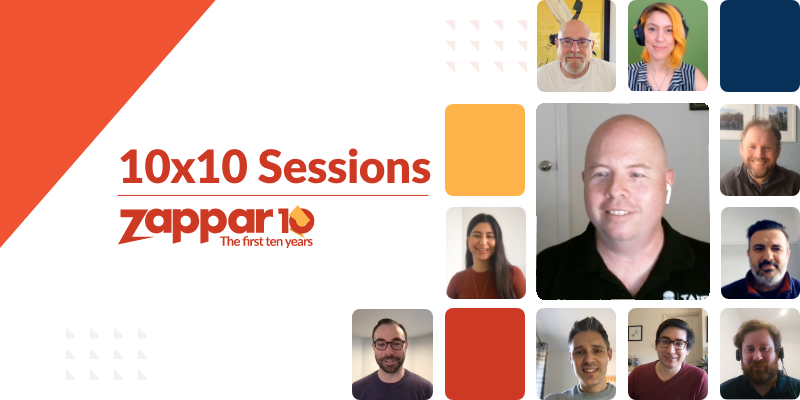For this 10x10 Session, the Co-Founder and CEO of Zappar Ltd (Caspar Thykier) is joined by Joe Millward, Innovation Manager at TAFE NSW.
TAFE NSW is Australia's leading vocational education and training provider. With over 100 years of experience, it caters for students at local, national, and international levels.
The Conversation:
Caspar Thykier: Today, we get to talk about XR in education and I can think of no better person to speak to on this subject then Joe Millward. So Joe, thanks for joining us. And perhaps you could start off by maybe introducing yourself and what you do.
Joe Millward: Yeah. Thanks Casper. So my name is Joel Millward, and I am the innovation manager at TAFE, with the largest vocational training center in the Southern hemisphere and an early adopter of XR.
Caspar Thykier: Absolutely. And indeed when you say early adopter, you've really kind of leaped ahead in terms of what everyone is doing around XR and education. So, when you think over the last 10 years, what are the lessons that you've learned at TAFE have learned about using XR in this sector?
Joe Millward: So for me, the lessons we've learned is to take advantage of the medium’s strength. So making sure that we look at what the technology does and how we apply that technology strength to the medium that we're playing with. So for me, it's really important that we look at the special environment that we'll manage in virtual realities, and also apply those based on their strengths.
So if we're looking at replacing the entire virtual world and having to simulate, that's something difficult that there are various realities, obviously where we want to place that, or if reality allows it. Flexibility for us to type that experience everywhere, especially with the phone. So being able to allow students to, to grab that device and, and experience a spatialized environment with their own devices or, anywhere that they can is really powerful for us.
The other part is also engagement. So both these technologies require you to be engaged 100%. You cannot not press play and walk away. So it requires you to be fully immersed. Fully engaged with the technology. And that's really powerful, especially with the distractions that technology delivers at the moment where students are in classes on their phones or they're distracted by other things.
These two technologies allow the teacher to, I guess, gain control, regain control of, of the experience and deliver a compelling experience that students are creating.
Caspar Thykier: And what subjects specifically, are you kind of looking at, have you seen the greatest success with these sorts of things, are there specific topics that it works perfectly well for?
Joe Millward: For us, definitely areas of danger or hazards are very important. Being able to show things. In both mediums, that we couldn't do safely easily especially for students that are entering a new space. So if they're in a welding environment or working at Heights that's really important for us to be able to do that and do that safely with the mediums. Other things are definitely impossible.
So, being able to show the anatomy of an animal really easily we can do that with the phone. We've done that quite often. And then giving them access to things as well. So the fact that they can use the device and be able to access an expensive piece of equipment or, or something that they can access easily when they're especially remote as we are at the moment. And I can still get an understanding of what that device looks like.
Caspar Thykier: And as someone who's really seen the technology mature over the past 10 years, are there moments in terms of breakthroughs that, that you saw that kind of have, taken what almost the ambition of what you wants to do early on.
Joe Millward: Definitely. For me, I experienced augmented reality back in 2008, 2009, seeing webcam experiments coming out of animation studios in Australia. And I thought, this is great, but when's it going to be available? I think obviously people are moments.
And I worked closely with David Francis and the people at Virtual Method on some stuff in past roles that I've been in conferences. And that showed me that people were able to look at this medium and, and something new where they can engage with really quickly and communicate messages really effectively and translate that to education. It's the same thing. We want that low level of friction, someone able to scan a code or, or look at an image really quickly and be able to get something from that fast. And that's been really impressive for us.
Caspar Thykier: Yeah, absolutely. And how have you found how to get that message out to teachers and students? Do you find that they're receptive to this technology?
Joe Millward: Oh, without a doubt. I mean, the, the students often drive the teachers, which is great. I mean last year we allowed students to download that bar licenses and are able to experiment and explore. And that's been really great to see the students driving the teachers. Especially for animation students, that's been really important for them to be able to play and explore experimentally. And I'll see that increase. I mean, even with high school students as primary students, they're exploring those spaces. So for us as a tertiary educator, we need to ensure that what we're delivering is in line with what's happening.
Coming out of high school, we want to make sure that the expectations available and that technology is there as well for them to explore. And the teachers, they're getting up to speed really quickly, but they're definitely seeing the engagement levels increase in their students.
Caspar Thykier: Yeah. I mean, we've talked a lot about trying to develop this next generation of digital developers and designers. Are you really seeing them come through? Are you seeing more people kind of wanting to get into space?
Joe Millward: Yeah. And I think, there's, there's an evolution. Everybody gets it. So these in small places, obviously things like Pokemon Go and other things mainstream, some of these technologies but also people like graphic designers who are starting to get their heads around. We've got to start to enhance our, our traditional mediums and, and add a layer of complexity, or layer of engagement that they haven't had before. And the fact that the technologies like that are coming along that are able and willing to do that is really amazing. And I think we'll continue to see that, especially as your Gen Z has become, people in the industry who are starting to influence that too.
Caspar Thykier: Yeah. Very cool. Well, final question then. So what excites you about what you see coming down the track in XR and in education?
Joe Millward: I think the interesting thing for us is we're building the rules for the next computing paradigm. So we're looking at what technology has been done over the last 10 years. And I mean, obviously it's Apple has been there the whole time for us. There's an open opportunity. But we have to ensure that we write the rules correctly. Why, and that we're able to give students and teachers and, and any, any mainstream people, an understanding of what this is going to look like and get them prepared for how things are going to shift.
I think we've spent a lot of time trying to convince people that technology's ready. And I think it is really now. But things like the AR glasses, which are only around the corner by maybe three to five years away, we've got to build the framework to ensure that we're ready when that stuff hits, because it's going to happen fast. So we've got to make sure that we've got the opportunity for us to have all the 3D content ready. We understand how spatial computing works in the education environment. And once these devices are available mainstream that we're like, yeah, that's fine. We can just flick a switch and rival and up and ready. And I think the mobile experience, and obviously these are to VR headsets have started that journey. But I think. For us to continue to ensure that we're looking at 3D content, we're looking at photogrammetry and spatial computing will put us in good state as we move into the future.
Caspar Thykier: Yeah, absolutely. I mean, I, that having that foundational understanding of everything is as you guys do and all those things, you've mentioned that you've such a brilliant place and it is definitely an exciting time and well, Joe, thank you so much, really appreciate your time wonderful to have your, your perspective.
Joe Millward: Thanks, Casper.
 Christie Clark
Christie ClarkCRM Executive, Zappar
